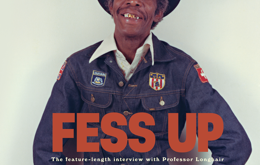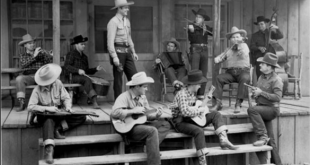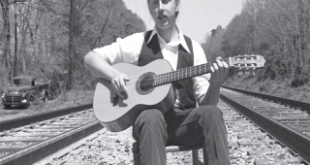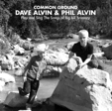 Spying the Grim Reaper in the rear view mirror evokes a range of responses. `Getting religion’ or reaching for the gin are common ones. Dave Alvin’s reaction to his brother Phil’s near-death and the passing of old friends was novel: instead of seeking salvation or oblivion, he joined forces with his brother to record an album of Big Bill Broonzy songs, a mission he was driven to fulfill, he said in interviews, “before we all croak.”
Spying the Grim Reaper in the rear view mirror evokes a range of responses. `Getting religion’ or reaching for the gin are common ones. Dave Alvin’s reaction to his brother Phil’s near-death and the passing of old friends was novel: instead of seeking salvation or oblivion, he joined forces with his brother to record an album of Big Bill Broonzy songs, a mission he was driven to fulfill, he said in interviews, “before we all croak.”
Common Ground: Dave Alvin and Phil Alvin Play and Sing the Songs of Big Bill Broonzy (yeproc records) could just be an album with a quirky back story: founders of the L.A. roots rock band the Blasters reunite after decades apart to celebrate one of their first influences. A striking boyhood photo of the Alvins on rocks in a creek underscores a notion of lost innocence reclaimed. Thankfully, that’s the sole hint of nostalgia here (tribute albums rarely shy away from sentimentality). The Alvins roll up their sleeves and play a dozen Broonzy songs (one’s an instrumental) with workmanlike gusto. The tendency of recreations of vintage American roots music towards preciousness is absent here: instead, the Alvins beef up their Broonzy with Dave’s driving electric guitar and a full band on some tracks. Others offer the leaner sound of the Alvins on acoustic guitars, supported by standup bass and low-key drumming. The variety of approaches sounds entirely uncontrived, as does the album overall. You don’t have to know a thing about Broonzy to like it, but it doesn’t insult the intelligence of Broonzy’s fans, either. Fittingly, Common Ground debuted at #1 on Billboard’s blues chart on its release in early June.
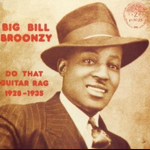 Broonzy was hugely popular for three decades among black record buyers and mentored artists who would eclipse him in the 1950s, notably Muddy Waters. His tours of Europe and England, coupled with appearances in America before white folk audiences, sealed his rep as `folk-blues legend.’ But legends tend to get lost over time, which is why Bob Riesman’s recent biography of Broonzy is so welcome. I Feel So Good: The Life and Times of Big Bill Broonzy (University of Chicago Press) is deeply researched and superbly written. Riesman’s years of digging yield some surprises: for one, Broonzy claimed to be a decade older than he was (he was born 1903, died 1958). Broonzy’s knack for spinning yarns was plain in his autobiography, Big Bill Blues: William Broonzy’s Story (Da Capo Press), still a delightful read. Don’t overlook his music, either: there’s plenty of it, including a recent release on the Document label, Big Bill Broonzy, Volume 13 (1949-1951). This latest entry in a `complete recorded works’ series offers everything from searing electric R&B to Broonzy accompanied by an Australian Dixieland band!
Broonzy was hugely popular for three decades among black record buyers and mentored artists who would eclipse him in the 1950s, notably Muddy Waters. His tours of Europe and England, coupled with appearances in America before white folk audiences, sealed his rep as `folk-blues legend.’ But legends tend to get lost over time, which is why Bob Riesman’s recent biography of Broonzy is so welcome. I Feel So Good: The Life and Times of Big Bill Broonzy (University of Chicago Press) is deeply researched and superbly written. Riesman’s years of digging yield some surprises: for one, Broonzy claimed to be a decade older than he was (he was born 1903, died 1958). Broonzy’s knack for spinning yarns was plain in his autobiography, Big Bill Blues: William Broonzy’s Story (Da Capo Press), still a delightful read. Don’t overlook his music, either: there’s plenty of it, including a recent release on the Document label, Big Bill Broonzy, Volume 13 (1949-1951). This latest entry in a `complete recorded works’ series offers everything from searing electric R&B to Broonzy accompanied by an Australian Dixieland band!
 Baja Review A community newspaper serving Ensenada, Valle de Guadalupe, and Rosarito in Northern Baja California
Baja Review A community newspaper serving Ensenada, Valle de Guadalupe, and Rosarito in Northern Baja California


